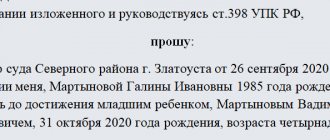Request for documents (police): what acts is it regulated by?
You have received a request from the police for information, and for one reason or another you are not eager to comply with it, while at the same time fearing the consequences? Contact me for help, and I will offer you possible solutions to the problem.
First, let's look at the legal grounds for sending requests for documents (information) to units of the Ministry of Internal Affairs of the Russian Federation.
First of all, this is the Federal Law of 02/07/2011 N 3-FZ “On the Police”, according to clause 4 of part 1 of Art. 14 of which police officers have the right to request and receive, free of charge from citizens and organizations upon a reasoned request, information, certificates, documents (copies thereof), and other necessary information in connection with criminal cases under investigation and pending cases of administrative offenses, as well as in connection with verification of statements and reports of crimes, administrative offenses, and incidents registered in accordance with the procedure established by law, the resolution of which falls within the competence of the police, with the exception of cases where federal law establishes a special procedure for obtaining information.
Please note that police officers do not have the right to demand the provision of information and documents outside of the investigation or consideration of a specific criminal case, an administrative offense case or an operational (pre-investigation) investigation. Accordingly, the received request must indicate a number or other information that would allow the request to be identified as related to a specific criminal case, an administrative offense case or an operational investigation case (for example, the name of the accused, the person reporting the crime, etc.) Otherwise In this case, the police request for information (documents) may be considered illegal.
The literature often expresses the opinion that a request for documents must be not only legal, but also justified. That is, the request must indicate how the requested information is related to the specific case being processed by the police authority. Of course, it would not be bad to enshrine such a provision in law in order to protect the rights of citizens. However, today such a rule does not exist, and therefore the absence of justification in the request does not entail any legal consequences.
In addition to the Law “On the Police,” employees of various departments of the Ministry of Internal Affairs of the Russian Federation, when sending a request, often refer to Federal Law No. 144-FZ of August 12, 1995 “On Operational Investigative Activities.” Part 1 of Article 6, among other types of operational-search activities, calls for making inquiries. During this operational investigation, police officers can receive any information from citizens and organizations. If the received request contains a reference to this norm, then the request for information should be considered under the prism of this particular federal law.
When assessing the legality of providing documents in this case, one should first of all establish the existence of grounds for carrying out operational investigative measures specified in Art. 7 Federal Law “On operational investigative activities”, which include:
- The presence of a criminal case.
- Information about:
signs of an illegal act being prepared, committed or committed, as well as about the persons preparing, committing or having committed it, if there is not sufficient data to resolve the issue of initiating a criminal case;
- events or actions (inaction) that create a threat to the state, military, economic, information or environmental security of the Russian Federation;
- persons hiding from the bodies of inquiry, investigation and court or evading criminal punishment;
- missing persons and the discovery of unidentified corpses.
Ways to miss deadlines
The existence of a pre-investigation stage in Russian criminal proceedings is associated with the presence of a number of problems that ordinary citizens and lawyers representing their interests face when filing allegations of crimes.
In the 90s, the main difficulty was submitting an application to the internal affairs bodies itself - employees of the duty units of territorial departments often refused to accept applications on far-fetched pretexts. The measures taken by the state to combat the concealment of information about crimes helped correct this situation. Currently, especially in large cities, regional centers and districts, there is no such problem. However, other obstacles have arisen in the realization by victims of their right to receive protection from crimes by contacting law enforcement agencies, especially during inspections by territorial police authorities.
Let me remind you that the main normative acts regulating the procedure for receiving, registering and resolving reports of crime in internal affairs bodies are the Criminal Procedure Code of the Russian Federation and the Administrative Regulations approved by Order of the Ministry of Internal Affairs of the Russian Federation of March 1, 2012 No. 140.
With an adequate interpretation of these regulations, the existing procedure for considering reports of a crime seems very clear and logical. However, in practice, applicants and practicing lawyers are faced with a very free interpretation of them by law enforcement officials, which creates serious and sometimes insoluble obstacles in the implementation of one of the main purposes of criminal proceedings enshrined in Art. 6 of the Code of Criminal Procedure of the Russian Federation, - protecting the rights and legitimate interests of persons and organizations that have suffered from crimes.
So, in accordance with Part 1 of Art. 144 of the Code of Criminal Procedure of the Russian Federation establishes a general 3-day period for checking reports of any committed or impending crime. According to part 3 of this article, at the motivated request of the investigator, interrogating officer, this period can be extended to 10 days, respectively, by the head of the investigative body or the head of the inquiry body, and if necessary, to carry out inspections, audits, examinations, research, and conduct operational investigative activities - up to 30 days, respectively, by the head of the investigative body or the prosecutor. Thus, the maximum period established by current legislation for verifying a crime report is 30 days.
This period is calculated from the date of receipt of a report of a crime, namely from the date of registration of a report or statement of a crime in the Book of Records of Statements (Messages) of Crimes, Administrative Offenses and Incidents (KUSP) by an employee of the duty station of a territorial police authority.
Meanwhile, in practice, police authorities do not always comply with this deadline. Thus, employees of internal affairs bodies, in order to formally comply with deadlines and obtain additional time beyond 30 days to conduct an inspection, resort to various ways of interpreting existing norms in their own interests, which do not correspond to both the letter and the spirit of the law. Let's look at the main ones.
1. Re-registration in KUSP . If it is necessary to obtain additional time to conduct an inspection by internal affairs bodies, especially in cases in the economic sphere, the method of re-registration of material under the KUSP is used. In this case, the deadlines are calculated from the date of new registration. This practice has been used for quite a long time and gives police officers the opportunity to actually stretch out the inspection for 2-3 months.
Unfortunately, the prosecutor's office does not react harshly enough to this creative and non-legal approach of the internal affairs bodies when interpreting existing procedural rules. Perhaps that is why in the last two years, employees of such bodies have gone even further in this direction. Thus, when considering statements of a crime by employees of the Department of Economic Safety and Internal Affairs of the district departments of internal affairs of Moscow, increasingly, the 30-day period for checking a crime report is calculated not from the registration of the application in the KUSP, but from the date of receipt of the inspection material by the relevant department of the Internal Affairs Directorate.
For example, on March 12, 2021, a statement about committing a crime in the economic sphere, signed by the general director of ZAO “S”, was submitted to the OEBiPK Department of Internal Affairs for the Central Administrative District of the Main Directorate of the Ministry of Internal Affairs of the Russian Federation in Moscow. After the expiration of the maximum 30-day period for conducting the inspection, extended by the prosecutor, the inspection material was sent on the last day of the period to the investigative department of the same district department. In the investigative department, the material was in production for another 30 days, and on the last day of the inspection, the material was sent back to the Department of Internal Affairs of the Internal Affairs Department for carrying out additional operational investigative activities. Subsequently, he was redirected between the investigative and operational departments of the Internal Affairs Directorate in a similar manner several more times. Moreover, each time the 30-day inspection period was calculated from the date of registration of the material in the secretariat of the investigative or operational unit without changing the number and re-registration in the KUSP, and the decision to initiate a criminal case was made only in December 2021, that is, after 7 months from the date of registration of the statement of crime in the KUSP.
Thus, in fact, the verification of the crime report was carried out several times exceeding the maximum 30-day verification period established by law.
2. Illegal and unfounded refusal to initiate a criminal case . A very common method used in order to obtain additional time not provided for by law to conduct an inspection, used by both employees of internal affairs bodies and divisions of the Investigative Committee of the Russian Federation, is to issue, after the 30-day inspection period, an unfounded decision to refuse to initiate criminal proceedings for lack of corpus delicti. In this case, the decision to refuse is canceled as illegal and unfounded by the prosecutor or the head of the investigative body, and the executor receives an additional 30-day period to conduct an inspection. This procedure for unlawful refusal to initiate a criminal case can be applied on the same application several times, which allows, with external compliance with the law, to significantly extend the inspection period beyond the actual 30 days.
So, on March 14, 2021, the Internal Affairs Directorate for the Central Administrative District of the Main Directorate of the Ministry of Internal Affairs of the Russian Federation in Moscow received a statement from Mr. A. After the 30-day period had passed, on April 14, 2021, the police officer who conducted the inspection issued a resolution about the refusal to initiate a criminal case due to the lack of corpus delicti, while the decision stated that the applicant’s arguments were confirmed, but in order to make a decision it is necessary to carry out additional operational investigative measures, which takes time. On April 23, 2021, the decision to refuse to initiate a criminal case was canceled by the prosecutor's office of the Central Administrative District of Moscow as illegal and unfounded, and the police officer who conducted the inspection was thus given an additional 30 days to conduct the inspection.
3. Unreasonable direction of material according to jurisdiction . Another method often used by internal affairs bodies to obtain additional time to conduct an inspection is the unreasonable referral of the investigation material to another territorial internal affairs body or to divisions of the Investigative Committee of the Russian Federation. In such cases, the material is guaranteed to be returned, and the period in practice is calculated from the date of return of the material.
Thus, according to the already mentioned above statement of commission of a crime, submitted by A. to the Department of Internal Affairs for the Central Administrative District of Moscow, the inspection material, after the expiration of an additional 30 days, was unreasonably sent, allegedly due to jurisdiction, to the Department of Internal Affairs for the city district of Khimki, from where it was returned after a month and a half. As a result of this manipulation, the operational officer again received an additional 30 days to conduct an inspection, which began to be calculated from the day the material was returned to the Internal Affairs Directorate for the Central Administrative District of Moscow.
I have listed three main ways. In practice, when conducting an audit on the same material, all of these methods are often combined, with the result that for individual applications, especially for crimes in the economic sphere, the audit actually drags on for a year or more. Meanwhile, violation of procedural deadlines when checking a crime report not only violates the rights and legitimate interests of crime victims and undermines trust in the state and its law enforcement agencies, but also impedes further criminal proceedings. The fact is that evidence is often destroyed or hidden due to lost time; persons who have committed a crime take measures to conceal property obtained by criminal means, may put pressure on the participants in the process or escape.
It should also be noted that the current criminal procedural legislation, which establishes the period for conducting checks of reports of a crime, is clear and logical, and does not require significant changes in this part. Violation of deadlines when considering statements of crimes is a problem of law enforcement practice, and in order to force employees of internal affairs bodies to comply with the law in this regard, a tough position of the supervisory authority represented by the prosecutor's office, as well as heads of internal affairs bodies, especially from the heads of investigative bodies, is necessary divisions. However, given the current loyal attitude of these officials towards the use of these illegal methods by their subordinates, one cannot expect a change in the situation in the near future.
Under such circumstances, applicants and lawyers must, in each case of violation of the inspection deadlines, immediately file complaints with the prosecutor and the head of the investigative body, the inquiry body, and also actively use the procedure for judicial appeal of violations of the law in accordance with Art. 125 Code of Criminal Procedure of the Russian Federation.
What the law says
The deadline for consideration of citizens' appeals to state bodies, local governments, and other organizations is 30 days from the date of registration of the document. It is a violation to send a response outside of its boundaries. There are peculiarities in the consideration of oral and written statements, and nuances in calculations.
There are special rules on the period for consideration of individual requests in Federal Law 59 itself. In Art. 12 states that the highest official of a constituent entity of the Russian Federation is given only 20 days to make a decision on a written report of facts of violation of migration laws.
Many regulatory documents have significantly reduced the periods for providing information and information. Thus, according to the rules for maintaining common property in an apartment building, approved by Decree of the Government of the Russian Federation No. 491 of August 13, 2006, the provider of housing and communal services is obliged to provide the owner of the residential premises with a list of services provided no later than 5 working days from the date of the request.
To oral statements
Art. 13 Federal Law 59 regulates the procedure for personal reception of applicants, but it does not specifically establish a deadline for responding to citizens’ statements made orally. Part 3 states that questions are answered directly during the appointment and do not require additional specialist training. In other cases, a written response is drawn up in the standard manner.
Based on this, we can conclude that the time frame for responding to citizens’ requests orally is as follows:
- to obvious questions - during the reception orally;
- for more complex questions - 30 days in writing.
If a written statement is formulated during a personal visit, it is considered in the standard manner.
For written requests
The procedure for providing a response to a written statement is clearly regulated by law and includes the following steps:
- First, the application is registered, which is given no more than 3 days.
- Then the review is carried out within a month, 30 days, in exceptional cases this period is extended by the head for another month. The contractor must send an interim response to the citizen’s appeal indicating an extension of the review process.
- If during the preparation of the response it is determined that the questions in the request are not within the competence of the organization, it forwards it to the authorized government agency with mandatory notification of the applicant.
It turns out that the 30 days specified in the law in practice amount to 33 days or 46 days (30 days of consideration plus 6 days for registration in both organizations). Taking into account possible forwarding and extension, as well as registration, the answer to the question of what is the maximum period for the execution of citizens’ appeals is 73 days (30 days for consideration, plus 30 taking into account the extension, 7 days for forwarding, plus 6 days for registration). And all these periods do not include postage.
Time limits for consideration of an application by the local police
My appeal to you, dear lawyers, is a plea for help, a cry from the heart, and a desire to restore justice in a legal way.
The situation is as follows. We have a long-term conflict with our neighbor. In November, when I left the house, she gave me TP: she scratched my face. We are completely different people, and I am not able to answer her in the same way, so I filed a statement with the police and removed the beatings. My application was accepted... and that's it. No action, no information, no matter how much I demanded: the district police officer on the phone reports that he cannot find her, that she did not open the door for him, that he will go to her tomorrow, etc. “In a roundabout way,” I unofficially learned that he had closed the case. She filed a complaint about the district police officer’s inaction with the prosecutor’s office. They forwarded my statement back to the police. Another district police officer came and questioned me - and again there was silence. Again, no one gives me any information. I wrote an application to the head of the Department of Internal Affairs with a request to notify me about the results of the consideration of my applications, but the duty station did not accept the application, they said, call the district police officer and find out from him.
I sent an application to the head of the Department of Internal Affairs with a request to notify me of the results by registered mail. A month passed - no answer, no greeting. I sent the same application again, again by registered mail. The answer came literally two days later! This is a response to my first registered letter. In it, the head of the Department of Internal Affairs reports that an inspection was carried out on my application, no violations were identified in the actions of the district police officer, all notifications were sent to me in a timely manner (outgoing numbers are indicated). On the merits of my application, it is reported that a decision was made against the neighbor to initiate a case for an administrative offense under Art. 6.1.1 of the Code of Administrative Offenses, but then the case of the administrative offense was closed due to the expiration of the deadline and the impossibility of establishing the location of the person who committed it. Attached to the response is the district police officer’s resolution to terminate the proceedings “due to the absence of an administrative violation.”
My question: Where to go now? Who should I complain to? More than six months have passed, all the deadlines have long expired, and I only saw the order to terminate the case today (I can’t prove this - the police will say that they sent me papers, they have outgoing numbers). I understand that the district police officer doesn’t want to do extra work, and I can “forget” his inaction, but as for the neighbor, I want the matter to go to court. How can I achieve this? Help me please! Thank you in advance.
The procedure and timing for consideration by the local police commissioner of citizens' appeals.
⇐ PreviousPage 26 of 28Next ⇒
Consideration of appeals from citizens of the Russian Federation, foreign citizens, stateless persons, associations of citizens, including legal entities, in the system of the Ministry of Internal Affairs of Russia is carried out by divisions of the central apparatus of the Ministry of Internal Affairs of Russia, territorial bodies of the Ministry of Internal Affairs of Russia, educational institutions, research, medical and sanitary and sanatorium -resort organizations, district logistics departments, institutions, operational-territorial associations, formations and military units, military educational institutions of higher professional education and institutions of internal troops of the Ministry of Internal Affairs of Russia, as well as other organizations and units created to perform tasks and exercise powers assigned to the Ministry of Internal Affairs of Russia, in accordance with the Federal Law of May 2, 2006 No. 59-FZ “On the procedure for considering appeals from citizens of the Russian Federation.”
A written request must contain:
The name of the internal affairs body to which the appeal is sent, or the surname, first name, patronymic (the latter - if available) of the official of the internal affairs body, or his position;
Last name, first name, patronymic (last if available) of the citizen;
Postal address for sending a response or notification of forwarding the request;
Personal signature and date;
If necessary, in support of his arguments, the citizen attaches documents and materials or copies thereof to the written appeal.
Newspapers, magazines and other printed publications received from a citizen without an application outlining the substance of the request are not subject to registration and consideration.
An online appeal must contain:
Last name, first name, patronymic (last if available) of the citizen;
An email address if the response or notice is to be sent in the form of an electronic document, or a postal address if the response or notice is to be sent in writing.
There is no response to the request:
If the appeal is recognized as anonymous by an authorized official;
If the appeal is recognized by the authorized official as unfounded and correspondence on the issues raised in the appeal is terminated.
An answer to the appeal on the merits of the questions raised is not given (of which the citizen is notified in writing within seven days from the date of registration of the appeal, if his name and postal address can be read):
If the appeal is found to be incorrect in content, presentation or form. If the appeal is considered incorrect in content, the citizen is warned about the inadmissibility of abuse of the right to appeal;
If the appeal contains issues the resolution of which is not within the competence of the internal affairs body;
If the appeal appeals against a court decision;
If it is impossible to prepare a response without disclosing information constituting a state or other secret protected by law.
An appeal in which a court decision is appealed is returned to the citizen who sent the appeal, without consideration, with an explanation of the procedure for appealing this court decision.
If the reasons why an answer on the merits of the questions raised in the appeal could not be sent were subsequently eliminated, the citizen has the right to again send the appeal to the internal affairs body.
If a citizen has provided knowingly false information in his appeal, expenses incurred in connection with the consideration of his appeal by an internal affairs body or an official may be recovered from this citizen by a court decision.
A citizen whose appeal is being considered by the internal affairs body must be provided with the opportunity to:
Submit additional documents and materials or request their request, including in electronic form;
To get acquainted with documents and materials related to the consideration of the application, if this does not contradict the legislation of the Russian Federation, does not affect the rights, freedoms and legitimate interests of other persons, and if these documents and materials do not contain information constituting a state or other secret protected by law;
Receive a written response on the merits of the questions raised in the appeal, or a notification of forwarding the appeal, in which the information is presented in writing on paper (hereinafter referred to as the written appeal) to a state body, local government body or official whose competence includes the decision of the issues raised addressing questions;
File a complaint against a decision made on an appeal or against actions (inaction) in connection with the consideration of an appeal in an administrative and (or) judicial manner in accordance with the legislation of the Russian Federation;
Apply for termination of consideration of the appeal;
Compensation for losses and compensation for moral damage caused by illegal actions (inaction) of the internal affairs body or its officials when considering an appeal, by court decision.
Deadline for consideration of applications
The period for providing public services is calculated in calendar days.
All appeals received by the internal affairs body are subject to mandatory registration within a period not exceeding three days from the date of their receipt, with the exception of complaints about decisions and actions (inaction) of internal affairs bodies and their officials in the provision of public services, which are registered no later than the next working days from the date of their receipt.
Appeals received by the internal affairs body in accordance with its competence are considered within thirty days from the date of their registration. If the deadline for consideration of an application falls on a weekend or non-working holiday, then the application must be considered on the previous working day. The specified period is calculated from the date of registration of the appeal with the internal affairs body until the date of signing the final response to the citizen.
Upon an appeal falling within the competence of the internal affairs body, its leadership makes an organizational decision on the procedure for considering it on its merits.
In exceptional cases, as well as in the case of sending a request, the period for consideration of the application may be extended by no more than thirty days with simultaneous written notification of this to the citizen.
To extend the period for consideration of the appeal, the head executor, no later than three days before the expiration of the established period, submits a report addressed to the manager who made the organizational decision on the procedure for considering the appeal, or an authorized official with information about the work done, the reasons for the extension, specific activities and the time frame required for completion consideration of the appeal.
Code of Criminal Procedure of the Russian Federation
(if the appeal contains signs of an offense)
Article 144. Procedure for considering a report of a crime
1. The inquiry officer, the inquiry body, the investigator, the head of the investigative body are obliged to accept, verify a message about any committed or impending crime and, within the competence established by this Code, make a decision on it no later than 3 days from the date of receipt of the specified message….
3. The head of the investigative body, the head of the inquiry body has the right, at the motivated request of the investigator or interrogating officer, respectively, to extend the period established by part one of this article to 10 days. If it is necessary to carry out documentary checks, audits, forensic examinations, studies of documents, objects, corpses, as well as conduct operational search activities, the head of the investigative body at the request of the investigator, and the prosecutor at the request of the investigator, has the right to extend this period to 30 days with mandatory indication of specific, the actual circumstances that served as the basis for such an extension.
⇐ Previous26Next ⇒
Recommended pages:
Lawyer Ufa
Updates from 05/17/2017, from 07/12/2017, 07/30/2017, 12/08/2020
The topic of “lawyer’s request” is the subject of discussions and proposals in the legal community and has recently received development in legislative activities and judicial practice. In this article I will try to express my view on the following issues that will be of interest to both lawyers and heads of state authorities, local governments, public associations and other organizations to which attorney requests are sent: - the legality of the requirements for the provision of information in the request; — deadline for responding to a lawyer’s request; — responsibility for failure to provide the requested information; — contents, sample form of a lawyer’s request; — attachments to a lawyer’s request: warrant, power of attorney; — grounds for refusal to provide the information requested by the lawyer;
Federal Law No. 160-FZ of June 2, 2021, which entered into force on June 13, 2021, introduced into Federal Law No. 63-FZ of May 31, 2002 “On advocacy and the legal profession in the Russian Federation”, Article 6.1 “Advocate request”, where the following definition is given to it: “an official request on issues within the competence of the specified bodies and organizations for the provision of certificates, characteristics and other documents necessary for the provision of qualified legal assistance.” The main purpose of a lawyer's request is to collect evidence to provide qualified legal assistance to the person whose interests the lawyer represents.
What can a lawyer request?
A lawyer's request may be sent to state authorities, local governments, public associations and other organizations on issues within the competence of these bodies and organizations regarding the provision of certificates, characteristics and other documents necessary for the provision of qualified legal assistance. The lawyer may be provided with the following information: certificates, characteristics, objects, documents, photographs, audio and video recordings and other media.
Deadline for responding to a lawyer's request.
In the original draft amendments to the federal law of 2014, it was assumed that the deadline for responding to a lawyer’s request would be set at 15 days, with the possibility of extension for the same number of days. However, Deputy Minister of Justice Mikhail Galperin explained during a plenary meeting on March 22, 2021 in the State Duma that “...you and I must be realistic...”. And today's realities are as follows.
In accordance with paragraph 1 of part 3 of Article 6 of the Law “On Advocacy and the Bar in the Russian Federation”, a lawyer’s right to collect information necessary for the provision of legal assistance, including requesting certificates, characteristics and other documents from state authorities and local governments is secured , as well as public associations and other organizations, in the manner prescribed by Article 6.1 of the Federal Law. The specified bodies and organizations, in the manner established by law, are obliged to provide the lawyer with the documents requested by him or their certified copies no later than one month from the date of receipt of the lawyer’s request. In cases requiring additional time to collect and provide the requested information, this period may be extended, but not more than thirty days, and the lawyer who sent the lawyer's request is sent a notice of the extension of the period for consideration of the lawyer's request.
For comparison, let’s consider what deadlines are provided for responding to requests from public authorities: - from the investigative committee - immediately or within the specified period (Clause 2 of Article 7 of the Law “On the Investigative Committee”) - from other investigators - the deadline is not established by law (at in practice, investigators sometimes set a deadline themselves) - from the prosecutor's office - within the established period (clause 2 of article 10 of the law "On the Prosecutor's Office") - from the police - within the period specified in the request, but no longer than a month from the date of delivery (clause 4 of art. .13 of the Law “On Police”).
What liability is provided for unlawful refusal to provide information to a lawyer? Update as of July 12, 2017. For an unlawful refusal to provide a response to a lawyer’s request, administrative liability has been introduced for officials in the form of a fine in the amount of 5 thousand to 10 thousand rubles (Federal Law No. 146-FZ of July 1, 2017, entered into force on July 12, 2017). Law No. 160-FZ dated June 2, 2016 added paragraph one of Article 5.39 of the Administrative Code. Article 5.39. Refusal to provide information An unlawful refusal to provide a citizen, including a lawyer in connection with a lawyer’s request received from him, and (or) an organization, information, the provision of which is provided for by federal laws, its untimely provision or the provision of knowingly unreliable information - (as amended by the Federal Law of June 2, 2016 No. 160-FZ) entails the imposition of an administrative fine on officials in the amount of five thousand to ten thousand rubles. (as amended by Federal Law No. 146-FZ dated July 1, 2017) Help . On August 22, 2016, the magistrate of judicial district No. 1 of the Zheleznodorozhny judicial district of Samara for the first time brought to administrative responsibility the director, who did not provide information on time at the lawyer’s request.
What are the requirements for the content and form of a lawyer’s request?
On September 2, 2021, the Ministry of Justice presented a draft order “On approval of the requirements for the form, procedure for filing and sending a lawyer’s request.” Public discussion was held until September 16, 2021. Based on the results of consideration of the submitted proposals, the text of the draft order was finalized. The revised draft order can be found at this link. An independent anti-corruption examination will be held from October 7 to October 13, 2021. Updated: On December 23, 2021, the order of the Ministry of Justice of Russia No. 288 dated December 14, 2016 “On approval of the requirements for the form, procedure for filing and sending a lawyer’s request” was published on the official Internet portal of legal information. Update from 12/08/2020. The Ministry of Justice of the Russian Federation, by order No. 295 of 11/30/2020, changed the requirements for the form, procedure for filing and sending a lawyer’s request, approved by order of the Ministry of Justice of the Russian Federation of 12/14/2016 N 288. .
Updated: July 30, 2017 Taking into account the decision of the Supreme Court of the Russian Federation AKPI17-103 dated May 24, 2017.
5. The lawyer’s request must contain : (From the moment the decision enters into legal force, the provisions of subclause 11, clause 5 of the Requirements are recognized as ineffective to the extent that they impose on the lawyer the obligation, when sending a request, to indicate the surname, name and patronymic of an individual or the name of a legal entity persons in whose interests the lawyer acts, in the absence of their consent to indicate this data.The provisions of sub-clause 12, clause 5 of the Requirements and Appendix No. 1 to the Requirements in the part establishing that a lawyer’s request must contain, if necessary, a justification for obtaining the requested information The rest of the administrative claim was rejected.) 1) full or abbreviated (if any) name of the government body, local government body, public association or other organization to which it is sent; 2) postal address of the government body, local government body, public association or other organization where it is sent; 3) last name, first name, patronymic (if any) of the lawyer; 4) registration number of the lawyer in the register of lawyers of the constituent entity of the Russian Federation; 5) details of the agreement on the provision of legal assistance, or order, or power of attorney (number, date of issue of the order, or power of attorney, or date of conclusion of the agreement); 6) the full or abbreviated name (if any) of the legal entity in which the lawyer sending the request carries out his activities; 7) postal address; if available, the email address and telephone/fax number of the lawyer sending the request; name of the document (lawyer's request); 9) registration number of the lawyer’s request in the register of lawyer’s requests; 10) an indication of the norm of the Federal Law in accordance with which the lawyer’s request is sent (in the preamble of the request); 11) last name, first name, patronymic (if any) of an individual or full (abbreviated) name of the legal entity in whose interests the lawyer acts. The procedural status of the person in whose interests the lawyer acts, the case number (the latter - with the participation of a lawyer in constitutional, civil, arbitration, criminal or administrative proceedings, as well as in cases of administrative offenses); 12) an indication of the requested information, including those contained in certificates, characteristics and other documents; if necessary, justification for obtaining the requested information; 13) an indication of the method of transmitting the requested information (by post, by fax, by email, by hand); 14) a list of documents attached to the lawyer’s request (if any); 15) date of registration of the lawyer’s request; 16) signature of the lawyer who sent the request, indicating the surname and initials.
2) postal address of the government body, local government body, public association or other organization where it is sent; 3) last name, first name, patronymic (if any) of the lawyer; 4) registration number of the lawyer in the register of lawyers of the constituent entity of the Russian Federation; 5) details of the agreement on the provision of legal assistance, or order, or power of attorney (number, date of issue of the order, or power of attorney, or date of conclusion of the agreement); 6) the full or abbreviated name (if any) of the legal entity in which the lawyer sending the request carries out his activities; 7) postal address; if available, the email address and telephone/fax number of the lawyer sending the request; name of the document (lawyer's request); 9) registration number of the lawyer’s request in the register of lawyer’s requests; 10) an indication of the norm of the Federal Law in accordance with which the lawyer’s request is sent (in the preamble of the request); 11) last name, first name, patronymic (if any) of an individual or full (abbreviated) name of the legal entity in whose interests the lawyer acts. The procedural status of the person in whose interests the lawyer acts, the case number (the latter - with the participation of a lawyer in constitutional, civil, arbitration, criminal or administrative proceedings, as well as in cases of administrative offenses); 12) an indication of the requested information, including those contained in certificates, characteristics and other documents; if necessary, justification for obtaining the requested information; 13) an indication of the method of transmitting the requested information (by post, by fax, by email, by hand); 14) a list of documents attached to the lawyer’s request (if any); 15) date of registration of the lawyer’s request; 16) signature of the lawyer who sent the request, indicating the surname and initials.
The request form is advisory in nature.
What documents must be attached to a lawyer's request?
In accordance with the finalized draft and approved order of the Ministry of Justice, the lawyer has the right, if necessary, to attach any documents and their copies to the lawyer’s request. The requirement to attach a copy of the order (power of attorney) and a lawyer’s certificate was excluded.
The procedure for sending a lawyer's request.
A special feature is that it has become possible to send a lawyer’s request both on paper and (or) electronically. A lawyer's request on paper can be sent by post, fax, or delivered in person or through a courier (messenger). A lawyer's request in the form of an electronic document can be sent to state authorities and local governments, and to public associations and other organizations - if they have the organizational and technical capacity to consider the request in electronic form.
In what cases may a lawyer be refused to provide information?
Clause 4 of Article 6.1 of the Federal Law provides an exhaustive list of grounds on which a lawyer may be refused to receive the requested information if: 1) the entity receiving the request does not have the information the lawyer needs; 2) the requested information is classified as information with limited access; 3) the requirements for the form, procedure for completing and sending the request have been violated* *For systematic failure to comply with the requirements established by law for a lawyer’s request, the status of a lawyer may be terminated by decision of the council of the bar chamber in which he is a member (subclause 2.1 of clause 2 of Article 17 of Federal Law No. 63). Thus, a lawyer cannot be provided with information that is classified by law as a state secret, information with limited access: medical, banking, commercial, tax secrets, communications secrets, information about notarial acts performed. Regarding confidential information and information related to personal data, there is a position of the Federal Law Enforcement Administration of the Russian Federation. More on this later.
Responsibility for Disclosure of Restricted Information.
The director of Ragtime LLC, Sergei Sharikov, contacted the FPA RF with a request to clarify whether a domain name registrar can provide personal data upon a motivated lawyer’s request, without fear of administrative liability. After all, even if the lawyer undertakes to use the information received solely for the purpose of using it as evidence in court, the registrar may be accused of violating the ban on the transfer of personal data, the company director suggested. Sergei Sharikov pointed out the contradiction of certain legislative norms. The provisions of the Federal Law “On Information, Information Technologies and Information Protection” allow the domain name registrar to provide personal data “for the purposes of judicial protection,” and the legislation regulating the circulation of personal data prohibits the transfer of such information. At the same time, the Rules for Registration of Domain Names in the .RU and .РФ domains dated October 5, 2011 stipulate that the administrator’s personal data is provided only on the condition that the third party’s request contains an obligation to “use the information received solely for the purpose of filing a legal claim.” . Executive Vice President of the FPA RF Andrei Suchkov, responding to a request, expressed his position that the provision of confidential information in response to a lawyer’s request is lawful. He recalled that each person, by submitting an application to register a domain name, agrees to the application of the legal regime. A lawyer, when requesting information in the course of his professional activities, acts in the interests of protecting the rights, freedoms and legitimate interests of citizens and organizations, which is implemented in pre-trial or judicial procedures.
The response to Ragtime LLC can be found at this link.
When refusing to respond to a lawyer’s request, heads of state authorities, local governments, public associations and other organizations often fear being held accountable for disclosing information in accordance with Article 13.14 of the Code of Administrative Offenses of the Russian Federation.
But administrative liability has also been established for the lawyers themselves. For disclosing restricted information that came into their possession in connection with the performance of official or professional duties, they face a fine of 4,000 to 5,000 rubles. (Note to Article 13.14 of the Administrative Code).
Conclusions.
Let me remind you that the purpose of the draft federal law was to eliminate legal conflicts and gaps in the legislation of the Russian Federation in the field of a lawyer’s request, as well as to comply with the constitutional principle of adversarialism and equality of parties at any stage of criminal, civil, administrative, and arbitration proceedings. Unfortunately, already in the second reading, all positive amendments, in terms of reducing the time period for considering a lawyer’s request, were rejected. Also, at a meeting of the Federation Council on May 25, 2016, Senator A.V. Belyakov drew the attention of the Secretary of State - Deputy Minister of Justice Yu.S. Lyubimov, who was present at the discussion. that this law does not ensure full equality of parties in legal proceedings .
From the transcript of the 394th meeting of the Federation Council: A.V. Belyakov : “...We always talk about the adversarial nature of the parties, including in criminal proceedings. The adversarial nature of the parties must presuppose equal rights for the prosecution and the defense. The prosecution - the prosecutor's office - makes a request, or the Investigative Committee, and there is liability, up to criminal liability, for failure to provide information, for providing it late, for providing false information at the request of the prosecution. Now we seem to be moving forward, and the speaker quite rightly voiced some things. But (what kind of half-heartedness is this, I don’t understand?) the law that we are now considering establishes among the grounds for refusal to provide information at a lawyer’s request (quote): “if the requested information is classified by law as information with limited access.” That is, if the prosecution requests, any information must be given, and if the bar asks, accordingly, if the information is of limited access, you don’t have to answer. What is restricted information? These are banks and banking activities, trade secrets, protecting the health of citizens may be with limited access, personal data, notaries, tax, customs matters and so on. Everything that concerns these legal areas, in fact, based on the text that we are now voting for, again becomes inaccessible to lawyers. Here you have, strictly speaking, colleagues, and the competitive nature of the parties. I would ask the distinguished representative of the Ministry of Justice to pay attention to this. And let me remind you that in the vast majority of countries there is simply a court. The court, the prosecution, the legal profession are a kind of unified whole. Misleading a lawyer is the same as misleading the court, and this is fraught with liability, including criminal liability. In our country, the court is one thing, the prosecution is another, and everything is fine there with responsibility and with the obligation to provide information, but a lawyer is some kind of flawed creature that prevents you from making a quicker decision, getting free faster, and convicting you faster. Unfortunately, it would seem that the law is correct, but again it is not even half-hearted, but moves us forward by one quarter instead of solving the problem radically.”
Y.S. Lyubimov . “Thank you very much for this comment. Our ministry has always taken the most pro-lawyer position; it’s just that this law, like any other, is probably a compromise. Therefore, we thought that it was simple... I agree with you that this is probably a quarter of the solution that we would like, but we thought that a quarter is better than nothing, so we perceive this as the first step towards an already full-fledged lawyer's request." Next, the Federal Law “On Amendments to Articles 5.39 and 13.14 of the Code of the Russian Federation on Administrative Offenses and the Federal Law “On Advocacy and the Bar in the Russian Federation” was put to a vote. Voting results: For 148 people. 87.1% Against 0 people. 0.0% Abstained 0 people. 0.0% 148 people voted. 22 people did not vote. Decision is made.
Summarizing the above, we must state that the prosecution still has more rights to access information. Changes to the law are just another declaration (but not implementation) of the existence of the principle of adversarial rights.
Update from 05/17/2017 On May 17, 2021, Bill No. 177929-7 “On Amendments to Article 6.1 of the Federal Law “On Advocacy and the Bar in the Russian Federation” was introduced into the State Duma, according to which it is proposed to reduce the period for providing a response to lawyer's request from 30 to 15 days.
The need to reduce the time required to respond to a lawyer’s request is due to the fact that currently the principle of equality of parties when collecting evidence is violated. Thus, for employees of the Investigative Committee of the Russian Federation, the prosecutor's office, the police, parliamentarians, even for journalists, the legislation establishes shortened deadlines for responding to their requests and appeals.
Update as of July 12, 2017. Russian President Vladimir Putin signed Federal Law No. 146-FZ dated July 1, 2017, which amended Art. 5.39 Code of Administrative Offenses of the Russian Federation “Refusal to provide information.” They are aimed at strengthening the administrative liability of officials for unlawful refusal to provide a citizen, including a lawyer, or an organization with information, the provision of which is provided for by law. It is interesting to note that the draft signed law was submitted to deputies for consideration back in September 2014, but after its adoption in the first reading in February 2015, work on it was not carried out until June of this year.
Update from 12/08/2020. The Ministry of Justice of the Russian Federation, by order No. 295 of November 30, 2020, changed the requirements for the form, procedure for execution and submission of a lawyer’s request, approved by order of the Ministry of Justice of the Russian Federation of December 14, 2016 N 288. The amendments come into force effective December 15, 2020.
You can download the lawyer request form from this link.
Based on materials: https://pravo.ru/review/view/129441/ https://www.samproc.ru/news/113/14890/ https://regulation.gov.ru/projects#npa=53328 https: //fparf.ru/news/all_news/news/24331/ https://www.council.gov.ru/activity/meetings/68070/transcript/ Bulletin of the FPA RF No. 3 2021 https://minjust.consultant. ru/documents/24847










